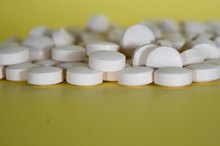Supplements That Strengthen Arteries & Blood Vessels
Proper circulation is essential for general health and well-being. Healthy arteries and blood vessels carry essential nutrients and oxygen to tissues and organs throughout the body. Certain natural supplements can strengthen blood vessels and promote healthy circulation.
If you are experiencing serious medical symptoms, seek emergency treatment immediately.
Pycnogenol
Pycnogenol is the patented name for the extract of the French maritime pine bark. This bark is cultivated in the coastal region of southern France, and many studies support its vein-strengthening properties. The National Institutes of Health (NIH) notes that pycnogenol contains bioflavonoids and oligomeric proanthocyanidins that have been reported to be responsible for the herb's therapeutic abilities, and that studies show that pycnogenol is an effective treatment for individuals suffering from chronic venous insufficiency 1. Common symptoms of chronic venous insufficiency include poor circulation, swelling, varicose veins and pain. Patients have reported reduced edema and pain, and increased circulation and vein health from pycnogenol. Pycnogenol is generally safe and well-tolerated by adults. The NIH recommends 25 to 360 mg in divided doses by mouth.
- Pycnogenol is the patented name for the extract of the French maritime pine bark.
- The National Institutes of Health (NIH) notes that pycnogenol contains bioflavonoids and oligomeric proanthocyanidins that have been reported to be responsible for the herb's therapeutic abilities, and that studies show that pycnogenol is an effective treatment for individuals suffering from chronic venous insufficiency 1.
Grape Seed Extract
What Are Horse Chestnut and Butcher's Broom?
Learn More
Studies from the National Center for Complementary and Alternative Medicine (NCCAM) suggest that grape seed extract promotes vein strength, and is used to treat poor circulation and other circulatory conditions such as high blood pressure and atherosclerosis. Grape seed extract contains protective antioxidants that promote better circulation, prevent damage to cells, prevent swelling, and promote proper blood flow after an injury or surgery, according to the NCCAM.
Horse Chesnut Seed
Horse chestnut seeds originated in parts of Asia and Greece, where they have been used medicinally for centuries 2. Supporting research from the NutraSanus database indicates that the seeds contain active compounds called aescin that have been reported to increase proper blood circulation and promote vessel health; aescin promotes blood circulation because it strengthens the walls of the veins and inhibits blood flow restrictions. Besides promoting blood flow, horse chestnut seed prevents inflammation within the veins that can lead to many disorders such as chronic venous insufficiency and varicose veins, according to NutraSanus 2. The most commonly recommended dose is 40 to 120 mg of horse chestnut seed extract daily 2.
Related Articles
References
- NIH. National Center for Complimentary and Integrative Health. Horse chestnut. Updated November 30, 2016.
- Dudek-Makuch M, Studzińska-Sroka E. Horse chestnut – efficacy and safety in chronic venous insufficiency: an overview. Rev Bras Farmacogn. 2015;25(5):533-41. doi:10.1016/j.bjp.2015.05.009
- Pittler MH, Ernst E. Horse chestnut seed extract for chronic venous insufficiency. Cochrane Database Syst Rev. 2012;11:CD003230. doi:10.1002/14651858.CD003230.pub4
- Drugs.com. Horse chestnut. Updated December 5, 2019.
- RxList. Horse chestnut.
- NIH. National Center for Complementary and Integrative Health. Horse Chestnut. Updated November 30, 2016.
Writer Bio
Anthony Isaac Palacios has been a professional writer for more than five years for various media including magazine, newspaper and the Internet. He has a Master of Science in dietetics and nutrition and specializes in health and nutrition articles for the general public. Palacios enjoys cooking with wine, and sometimes even adding it to the food.








